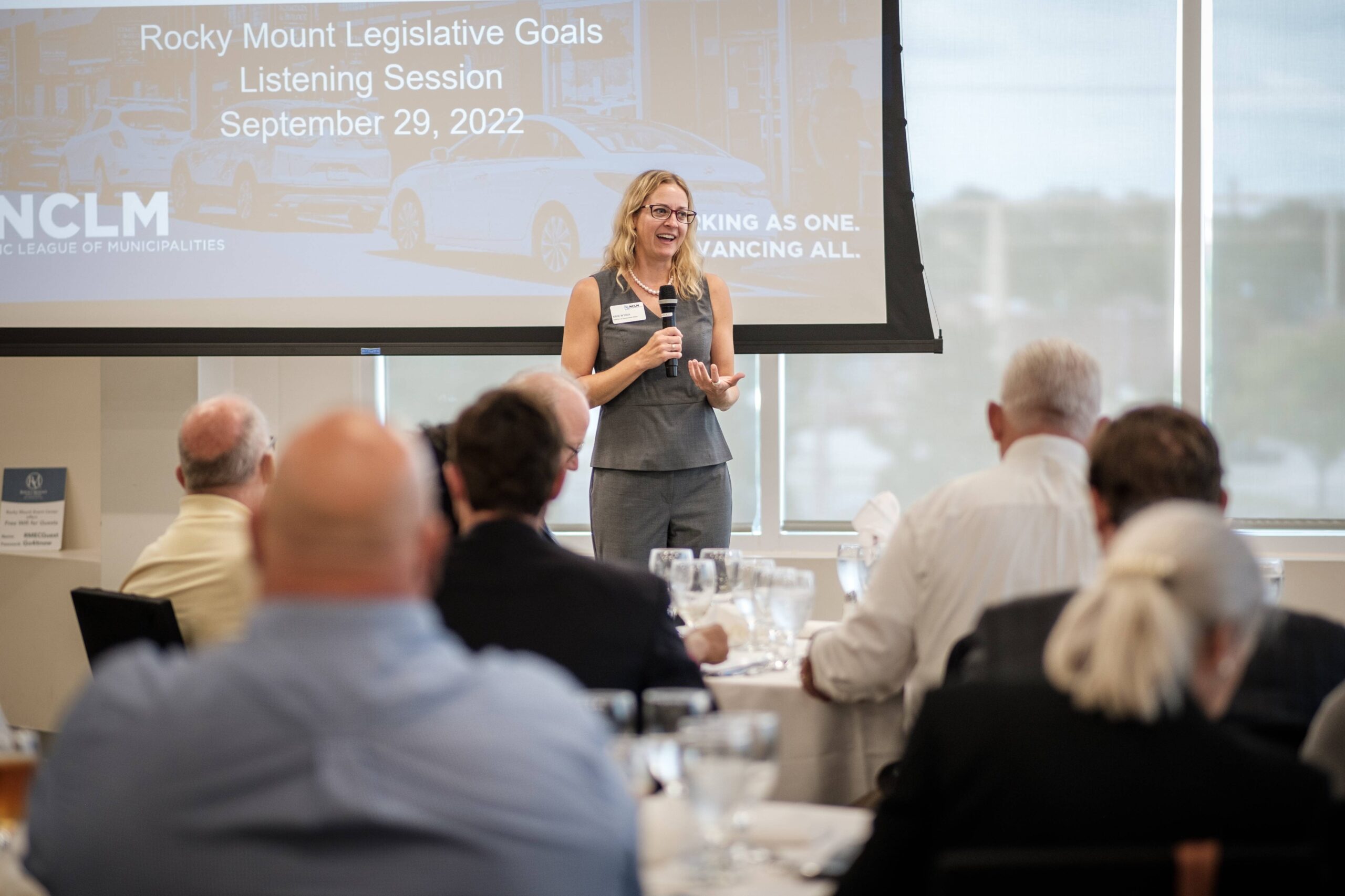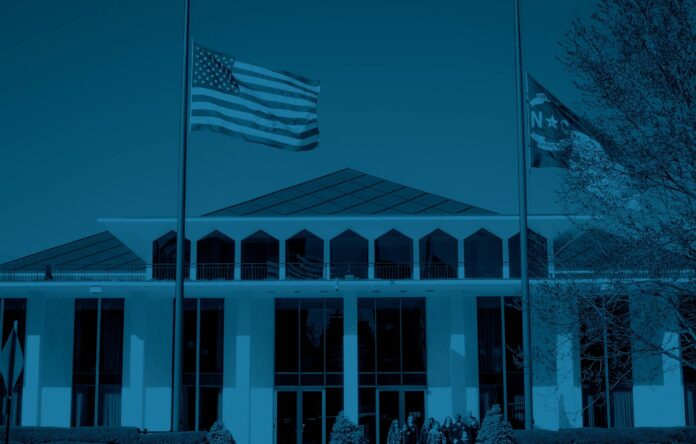After months of listening sessions, Legislative Policy Committee meetings, and finally electronic voting by member cities and towns, the NC League of Municipalities approved its Legislative Goals for the 2023–24 legislative biennium.
From 408 municipal goal proposals submitted through this process, falling into 50 distinct subject matter areas, 155 cities and towns approved a top 10 list of goals that now make up NCLM’s final legislative agenda. Not surprisingly, infrastructure-related goals were again a top priority, closely followed by proposals involving keeping cities and towns financially healthy. Housing and law enforcement training were also top concerns of North Carolina’s municipal leaders.
Of course, to turn these priorities into successful achievements, and get them passed into law, will not be easy. It never is. But it is important to note that the broad involvement of a diverse array of cities and towns, and their elected and appointed leaders, helps to make the case at the General Assembly that these goals represent the priorities of the municipalities in legislators’ districts, no matter where they live.
“Hundreds of cities and towns and their officials from across North Carolina gave their input and prioritized these legislative goals. These goals truly reflect the top priorities of all our cities and towns, whether small or large, and achieving them will move our economy even further ahead,” said Erin Wynia, NCLM’s Director of Government Affairs.
In addition to the voting, 111 officials from cities and towns participated in various in-person and virtual discussions, while the 65-member Policy Committee and NCLM Board of Directors played key roles in considering and narrowing priorities and developing goal language.
As the legislative session heats up, expect to see legislation that encompasses some of the aims of these goals. Some, especially those in the area of infrastructure, could show up in provisions in a state budget bill. Others may come in the form of standalone bills. Whatever the case, the advocacy of NCLM members will continue to be needed to try to gain legislative support. As always, that will involve individual conversations with legislators, as well as making the case through other forms of communication and even in formal committee hearings.
With that in mind, here are the member-approved 10 Legislative Goals for 2023–24, along with the subject areas approved by the League Board of Directors, and some brief talking points that can be used to demonstrate their importance to the challenges faced by North Carolina’s cities and towns.
 RESILIENT INFRASTRUCTURE
RESILIENT INFRASTRUCTURE
Create an adequate and permanent funding stream for local infrastructure.
- Infrastructure—including roads, water, sewer, stormwater, parks, and beaches—is critical to economic development and job creation.
- Many cities in the state are growing, creating a constant need for investment to keep pace with population growth; many cities and towns also have aging infrastructure that must be replaced.
- Creating more permanent funding streams for local infrastructure, such as a dedicated tax source, would allow for better planning to meet needs.
Expand state transportation funding streams for construction and maintenance for municipal and state-owned secondary roads.
- Current Powell Bill and other state funding is not adequate to address transportation needs, particularly as they affect municipal and state-owned secondary roads.
- In many cities and towns, major commuting corridors are not receiving the level of investment needed to keep pace with traffic.
- More investment is needed for these roads if existing residents are to embrace business and residential growth.
Allow municipalities to use local resources and capabilities to expand broadband access in their communities through innovative partnerships.
- Slow and unreliable internet service threatens educational and professional opportunities, and the economic future of entire communities.
- Municipalities own existing infrastructure—including dark fiber, towers, and electric poles—that could be utilized in innovative partnerships and assist in making broadband service more affordable.
- Failure to utilize local government assistance and assets will continue to create digital gaps that have real-world consequences for North Carolinians.
Expand incentives that encourage regionalization of water and sewer, as well as other municipal services, when appropriate.
- A number of municipal water and sewer systems continue to financially struggle with deferred maintenance needs.
- These challenges came about largely due to population and job losses in rural areas, leading to an erosion of taxpayer and ratepayer bases.
- While legislators and municipalities have begun to address these issues with the creation of the Viable Utility Reserve and the use of ARPA funding, state estimates show needs still exceed expenditures by several billion dollars.
Provide local revenue options beyond property tax.
- Roughly 40% of municipal general fund revenue is generated by local property taxes.
- Cities have little to no authority to raise significant revenue in other ways.
- A lack of diverse, local tax options can affect economic growth, as well as cause large swings in revenue based on economic changes.
Expand incentives and funding for local economic development.
- Funding is simply inadequate in many cities and towns to encourage job growth.
- State grants and incentives are often targeted in ways that fail to assist the areas in greatest need of job creation.
- Maintaining or expanding funding for film tax credits, major industrial site development, downtown development, and renewable energy tax credits helps cities and towns across the state.
 VIBRANT COMMUNITIES AND NEIGHBORHOODS
VIBRANT COMMUNITIES AND NEIGHBORHOODS
Expand federal and state resources for affordable housing.
- Housing affordability is a growing problem across North Carolina, affecting cities and towns of all sizes and people across different income levels.
- Increasingly, the lack of affordable housing acts as a major impediment to business and workforce recruitment.
- Ongoing state and federal revenue streams to address housing affordability are extremely limited, with much of the burden for solutions left with cities and towns.
Revitalize vacant and abandoned properties with enhanced legal tools and funding.
- Abandoned and vacant properties, often the subject of so-called tangled titles, can affect the ability of communities to revitalize areas and improve economic conditions.
- The abandoned properties, with enhanced legal tools to help heirs clear up title issues and sell properties at market rates, could help address local housing needs.
- Many towns do not have the funding to adequately address abandoned properties.
ADAPTIVE MUNICIPAL OPERATIONS
Enhance state systems and resources for local law enforcement officer recruitment, training, and retention.
- Municipalities across the state are facing law enforcement staffing shortages, in many cases severe shortages.
- State training resources are limited, and the cost of local law enforcement agencies to send recruits and existing officers to NC Justice Academy locations can be prohibitive.
- Grant writing assistance is one of several options that might provide better access to the large volume of federal law enforcement grant funding that is available.
Revise state contracting laws to better protect public entities from the effects of inflation.
- Labor and materials costs have been rising at a rapid rate, leaving municipalities with few options when project bids and costs exceed expectations.
- Additional flexibility regarding the contracting process could assist municipalities in protecting taxpayers from inflation and escalating costs.
- Without contracting law flexibility, projects can be delayed, and costs can further increase.
You can find a printable pdf handout of the goals on NCLM website at www.nclm.org/pages/advocacy/advocacy-goals.aspx. Also please use this page to look for updates on important legislation affecting both these priorities and legislation filed that could damage municipal authority.














